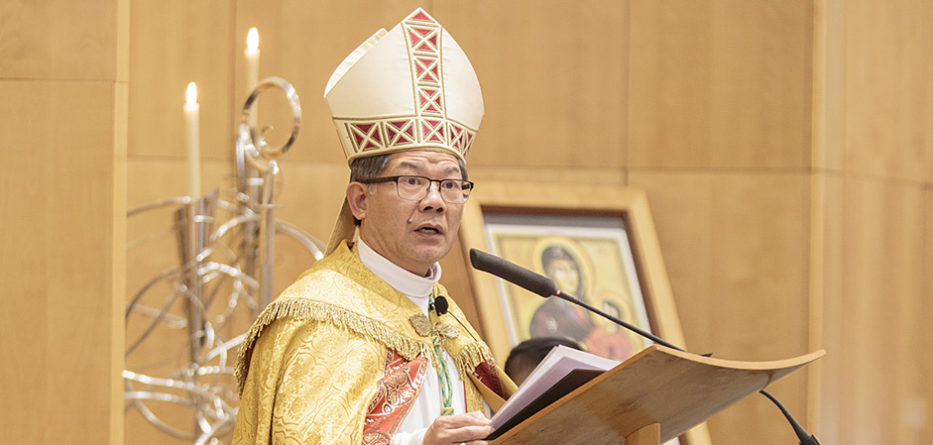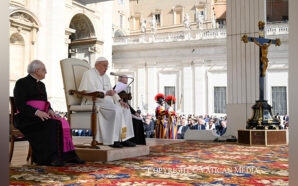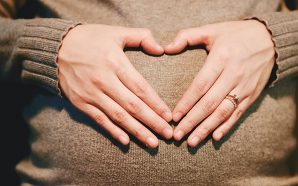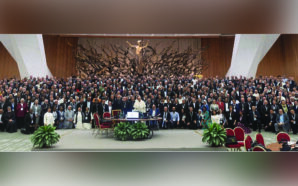Most Reverend Vincent Long Van Nguyen OFM Conv DD STL, Bishop of Parramatta
Homily for the Midnight Mass on Christmas Eve at St Patrick’s Cathedral, Parramatta.
Readings: Isaiah 9:1-7; Psalm 95(96):1-3, 11-13; Titus 2:11-14; Luke 2:1-14
24 December 2022
God’s commitment to the world and our partnership
Dear brothers and sisters,
“The people that walked in darkness has seen a great light”. These words of the prophet Isaiah are pertinent to us as we come to celebrate the birth of Christ, our joy and hope. No matter who we are and where we are on the journey of life, we are joined in the belief that God is with us in the flesh and in the world. United together, we are strengthened in our commitment to live the radical and subversive way of God revealed to us through the mystery of his incarnation. In these troubled times, when war threatens global security, populism undermines democracy, social inequity fosters mistrust and division, our faith in the incarnate God binds us in human solidarity and stewardship of all creation. For the birth of the child, Emmanuel symbolises God’s commitment to the world.
This is what we endeavour to do as a Gospel-centred community. The Church at its best is the embodiment of the divine project. As followers of Christ, we are called to act as catalysts for the transformation of the world in accordance with God’s plan. We are not meant to be comfortable with the status quo but to model a new way of living and relating that is in sync with the movement of the living spirit. We are inspired to be a leavening force and a headlight leading the human community to higher levels of justice, inclusion and flourishing for all.
On this solemn night, God’s Word assures us that darkness no longer has the upper hand. The world is no longer condemned but redeemed. God’s plan for us has become a reality even as the child is vulnerable and threatened. The seed of hope once sown will grow and realise its possibility. The path to victory is inevitable; God’s plan set in motion in the birth of the Emmanuel is unstoppable.
In the first reading, Isaiah speaks of the coming of Messiah who would inaugurate a new reign of justice and integrity. The prophet, however, describes this hero figure not in conventional terms of power and dominance. He alludes to the way God brought about the unlikely victory over the Midianites despite Israel’s inferior forces. Thus, quite contrary to the imperial ideology, the winners-take-all system and trickle-down political paradigm will be replaced by the new social order that favours the disadvantaged and the weak. The Messiah will be manifested as a Prince of Peace who will restore the exiled and dignify the oppressed. This prophecy, in effect, subverts the script of the empire and points to God’s vision of a new world through non-violence, solidarity and distributive justice.
Like Isaiah, Luke writing 800 years later describes the birth of Jesus as the new messianic era for humanity. “I bring you news of great joy”, the angel said to shepherds, “a joy to be shared by the whole people. Today in the town of David, a saviour has been born to you”. With this announcement, a new dawn had arrived for them, for humanity and indeed for the whole of creation. The birth of Jesus was framed with a backdrop of imperial census that meant heavier tax burdens and economic exploitation. The Holy Family was, like many of the poor today, victim of an unjust social system. Yet with the arrival of the Messiah, the reign of God prevailed over against the rule of greed, selfishness and corruption.
“Glory to God in the highest heaven, and peace to those who enjoy his favour”. We join the angels in praising the gift of the Prince of Peace. It is easy to assume that once Jesus was born, peace is finally established. But the truth is Caesar had already achieved his own version of peace known as the Pax Romana. This security pact was ruthlessly enforced through military might that people in distant corners of the empire like Palestine knew too well. God’s peace is entirely different. It is a new kind of peace to those willing to reimagine the world through the eyes of the lowly, marginalised and vulnerable.
Christmas offers us the opportunity to join the divine project of reconciling all in Christ. For with the Incarnation, God has reset the cycle of human behaviour. Jesus did not follow the script of the empire. He came as a poor and humble servant in order to minister at the thresholds of human vulnerability. He rejected violence, demonisation and scapegoating. We no longer need to use violence in order to counter violence; or resort to scapegoating mechanism to drive out the opponents. God in Christ enables us to build a new future with the very people whom we regard as outsiders and enemies.
Brothers and sisters,
The birth of Jesus signals God’s alignment with those who are at the edges of society. Only by caring for one another, for the most vulnerable and for all creation, can we harness the energy of love and embody the incarnate God. Let us pattern our lives on the self-emptying God. Let us learn to adopt a radical new way of relating and living that facilitates the diversity, harmony and sustainability of all of life. This Christmas, as we contemplate the Christ child in the manger, let us commit ourselves to pray and work for justice in all its manifestations so that God’s reign will come in our world.








